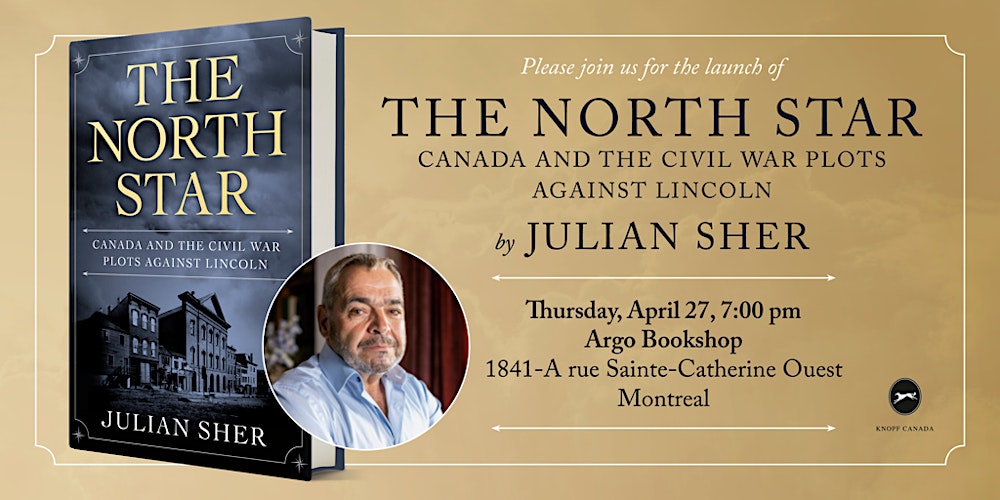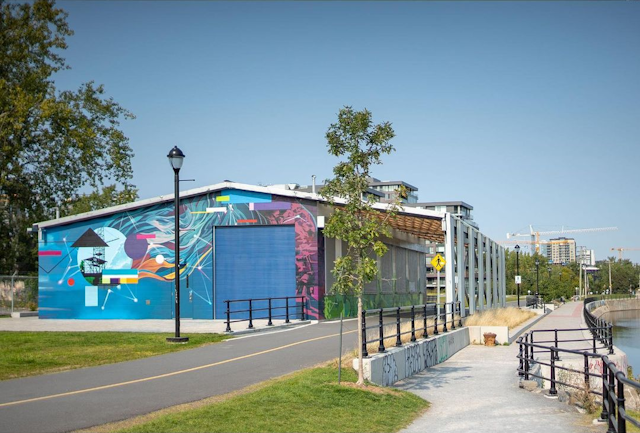Montreal: A nest of spies during the American Civil War
The director of the Crave Original documentary Kings of Coke recently sat down with The Main to talk about the release of his latest book, The North Star.

Julian Sher is no stranger to storytelling. The Canadian investigative journalist, author and filmmaker has spent decades researching and recounting accounts of our nation's history, often with a focus on its darker, more sinister aspects. His most recent documentary, Kings of Coke, chronicled the dominance of Montreal's West End Gang, an Irish Mafia that became one of the largest criminal organizations in North America.
Only six months following its release, Sher, 70, has followed up with another fascinating tale of Canadian history, this time with a book entitled The North Star: Canada and the Civil War Plots Against Lincoln, set to hit shelves on April 25. This latest publication uncovers some of the unexpected ways citizens north of the 49th parallel, particularly Montrealers, were involved in the American Civil War — including the eventual manhunt for Abraham Lincoln's assassin.
Sher's fascination with Canada's involvement in the American Civil War started when he was a history student at McGill in the 1970s. Walking past The Bay, he noticed a plaque embedded in the wall on the Union side of the building honouring the leader of the Confederate States, President Jefferson Davis. "I remember both as a Montrealer and as a history student, a kind of a WTF moment, like, what is that about? Why is there a plaque to the pro-slave Confederacy at our biggest department store? And why is it still here?"


And while Sher's first published work investigated the Ku Klux Klan in Canada, he went on to write a number of books on the Hell's Angels and the justice system — but his interest in this particular subject remained top of mind. The author's extensive experience as an investigative journalist, not to mention a general sense of curiosity, often leads him to favour the dark side of history as a way to surprise and shock his audience, adding elements of suspense to his stories.
"That's what we did with Kings of Coke," Sher admits. "We told Montrealers the little known story of [Irish] organized crime, but here was another chance to do the same with history." In documenting the story, Sher took literary inspiration from one of his favourite authors, Erik Larson, choosing to write this historical account in a way that would read like a thriller novel.
The main storyline of The North Star explores the role certain Canadians and Confederate agents played in the American Civil War. The author suggests that while most ordinary Canadians proudly associate themselves as the good guys — having facilitated the escape of tens of thousands of slaves through the extensive network known as Underground Railroad, which ended north of the U.S. border — the truth is that Montreal was actually much closer to what the author would call a Casablanca of sorts.
We were a nest of spies and scoundrels. We were the headquarters for these Confederate plotters, planners, and frankly terrorists who were hiding out in Montreal and using Montreal and Canada as a base to take on Lincoln.

During the course of the interview, Sher describes how everyday Montrealers were usually in support of the Union and Lincoln's desire to abolish slavery. At the outset of the war, thousands of Montrealers bravely took to the streets to protest as the Americans called for an escaped slave accused of murder to be sent back south, instead choosing to recognize that this man deserved his liberty in Canada.
But in what feels like the plot of a spy movie, the book closely examines the significant (and largely unknown) roles a number of Canadians played during the course of the American Civil War — often with Lincoln himself. One such character is Edward Doherty, who joined the American army and lead the regiment that would, within twelve days, hunt down and ultimately kill Lincoln's assassin, John Wilkes Booth.


A little-known fact revealed in the book is that Booth had come to Montreal for two weeks in October 1864, a few months before the assassination, to meet with Confederate agents in the Saint Lawrence Hall, then located on the corner of Saint-Jacques and Saint-François-Xavier. It was in Dooley's Bar where Booth plotted his eventual escape route to Canada and proclaimed that Lincoln's "goose was cooked."
When asked which character he would have liked to meet, Sher mentioned Canada's first Black doctor, Anderson Abbott, who met with Lincoln during a party at the White House — a rare moment in American history. A few months later, Abbott was called to Lincoln's side as he lay on his deathbed, and was gifted one of the president's shawls after he died.

Despite the fact that this story took place over 150 years ago, the author feels that the story is one still worth telling. "History tells us a lot about our past," Sher asserted. "If we deny the role that slavery played in our country, if we deny that the police chief, politicians, and bankers were supporting the slave states, how are we gonna deal with discrimination and racism today in Montreal? How are we gonna deal with the debates over racial profiling by the police? How will we deal with all the way Montreal and Quebec handle and welcome immigrants?"
"If we continue to have an amnesia about our past, then we don't know where we're going."
Sher chose to put Montreal at the forefront of the story, not only because he is from here, but because Montreal was an important hub in the 1860s; a bustling centre with significant political and economic influence that had a population of about a hundred thousand people at the time. "It's important to recognize its importance as what was then the largest metropolis in British North America," noted Sher.

Despite all the work that has gone into the production of both the recent documentary and the upcoming book, Sher admitted he wouldn't have it any other way. "I love writing. Documentaries always fascinate me, but this is my seventh book," said Sher. "There's nothing more passionate about getting up early in the morning and trying to figure out the best way to tell a story," he continued. "And in this case, when it's the story of your own town, Montreal, it was a thrill."

For those interested in meeting the author, Sher will host an event at Argo Bookshop on Thursday, April 27 at 7pm, where he will read some of the best scenes that take place in Montreal. Register for the free event here:

And just for fun, we asked Julian a few personal questions about his favourite spots in Montreal. Here goes:
- Diner: Burgundy Lion and Knox
- Neighbourhood: Little Burgundy
- Park: Mont-Royal
- Landmark: statue of Jackie Robinson
- First thing you do when returning from a trip: go cycling along the Lachine Canal and over the Champlain and Jacques-Cartier bridges
- Best thing about the city: the people and the mountain
- Worst thing about the city: orange cones

![The Bulletin: Orange cones as old as you, a new Leonard Cohen TV series, art fairs and flea markets [Issue #21]](/_next/image?url=https%3A%2F%2Fthemain.ghost.io%2Fcontent%2Fimages%2F2023%2F04%2FLeonard-Cohen.jpeg&w=640&q=75)






![A local's guide to the best things to do in Montreal [April 2025]](/_next/image?url=https%3A%2F%2Fthemain.ghost.io%2Fcontent%2Fimages%2F2025%2F04%2F47294-Credit-FR---Alison-Slattery---Two-Food-Photographers---Tourisme-Montre-al-EN-Credit---Alison-Slattery---Two-Food-Photographers---Tourisme-Montre-al.jpg&w=640&q=75)